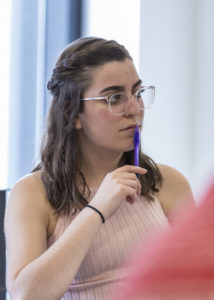

Developing musical perspectives. Music professor Mark Mazullo says that students from at least 15 different majors have taken his course, Musical Fictions, cross-listed in music and English, which has made for rich and wide-ranging classroom discussions. The course involves reading and discussing novels with the aim of developing musical perspectives on them. Rebecca Lewis ’21 (Locust Valley, N.Y.) a psychology major and English minor, says that “these are books I would not have picked up myself.” She’s found that the reading has spilled over into her everyday life when she’s studying with her friends. “There have been times when I’m reading a book for the class, and I’ll put it down for a second and say to my friend, ‘I have to tell you about this!’”
During the semester, students have read seven novels and various pieces of short fiction, written essays and reading responses, listened to assigned pieces of music, given a class presentation, and taken part in class discussions. Mazullo, says Lewis, “is really engaging and passionate…he enjoys sitting down with young people and starting conversations.”
Professor and pianist. Mazullo has a grand piano in the classroom. Sometimes he will play selections himself, or bring up YouTube videos of music that’s either featured in the reading, or from the time period in which a story takes place. “It just brings the text alive in a way that it wouldn’t if you didn’t listen to the music,” he says. During a discussion of Willa Cather’s Song of the Lark, the class listened to opera arias. For Jazz, by Toni Morrison, Mazullo played a recording of “Better Get It in Your Soul,” by Charles Mingus.
“What does music mean out in the world to people? This thing they take for granted actually has all of this power and significance out in the world of discourse.”
—Mark Mazullo
For an outside listening assignment, students heard Mazullo perform Beethoven’s late piano sonatas at two campus concerts. “He had actually played snippets of it for us in class to demonstrate things, but it was amazing to see him play,” says Lewis. “Sometimes I forget how talented he is as a piano player because I see him in class almost every day…We talk about literature and then he gets up on stage and does all of that. I still have the program in my backpack.”
The centerpiece. To lead discussions, Mazullo often asks questions about literature couched in musical terms—“Who solos in this book?” or “When do the chords change?” He says he wants “to get people listening to musical detail at the level they are reading detail in a text. Sounds mean things. Do you know what you are hearing? Do you hear what meter it’s in, or hear the clapping on the off-beats?”
While the reading list may vary from class to class, one novel that will always be a part of the course is The Unconsoled by Kazuo Ishiguro, says Mazullo. In fact, the course grew out of an essay Mazullo published about the novel. He says that while most of the people he’s convinced to read the novel have recounted moments of throwing it across the room out of frustration, he’s found ways into it that engage readers, and, by the end, “everyone loves it.”
Hearing what’s unheard. “So inevitably people who have never studied music have never really thought about music,” says Mazullo. “Music tends to be unseen, unheard, unthought of in the world. But once you start asking questions about why would a novelist choose this as a subject, or as a character…What does music mean out in the world to people? This thing they take for granted actually has all of this power and significance out in the world of discourse.”
October 28 2019
Back to top




